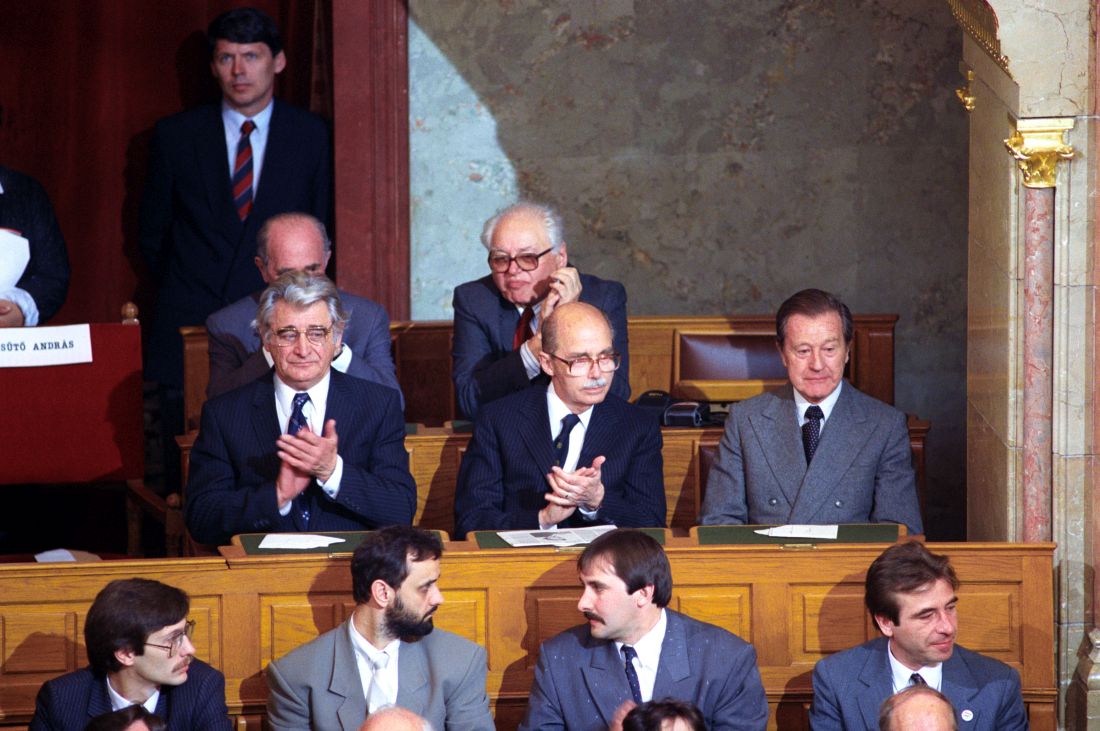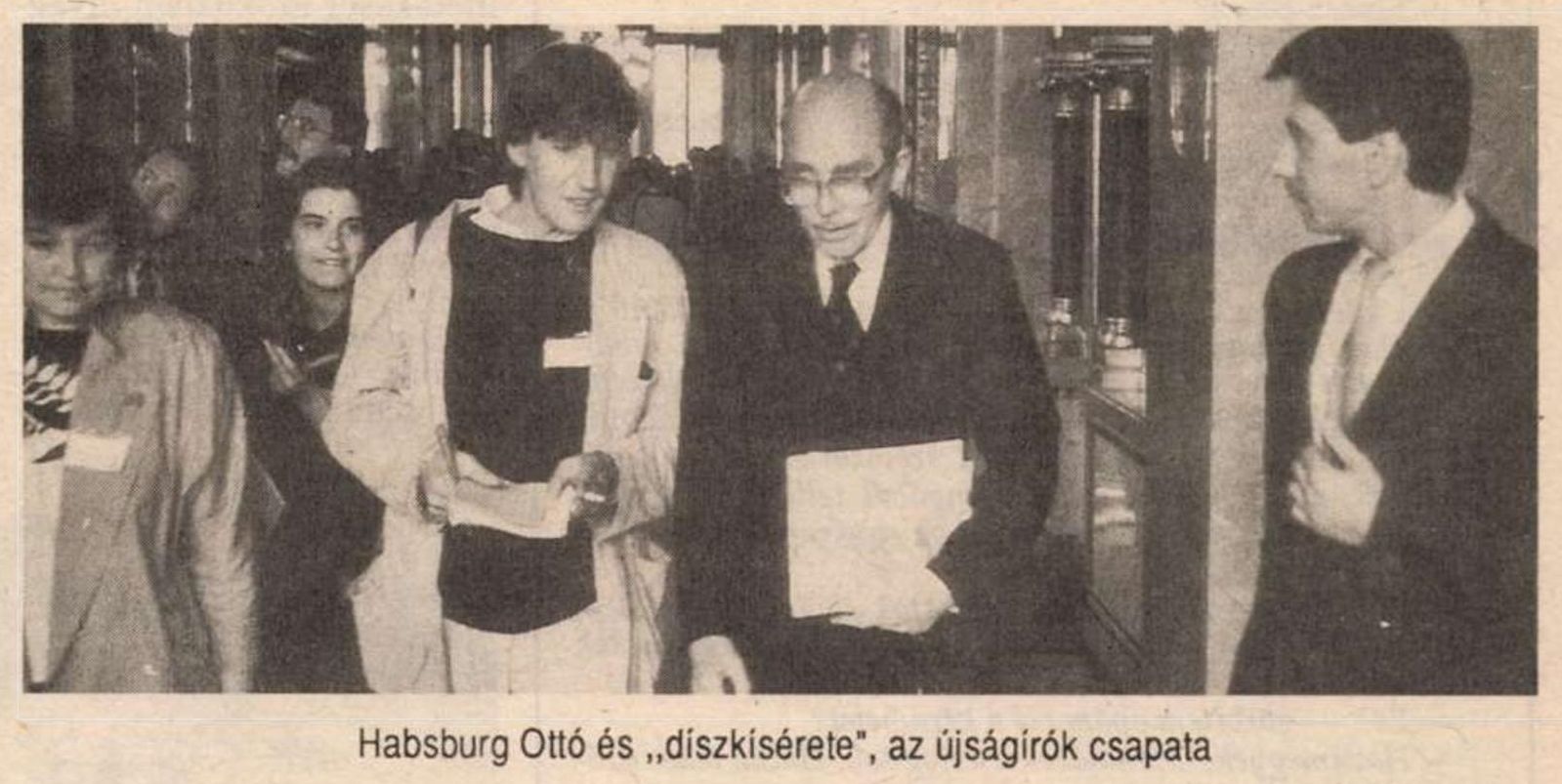Otto Habsburg was invited to the event by the Chairman of the European Parliament’s Committee on Hungary in a letter dated 19 April 1990 from Mátyás Szűrős, Foreign Minister of the Republic of Hungary. Otto Habsburg answered in the affirmative. Also invited were two vice-chairs of the European Parliament’s Committee on Hungary, Spanish Socialist Pedro Bofill and Italian Communist Renzo Trivelli.
The former heir to the throne arrived in Budapest on the evening of May 1, 1990, with his Spanish counterpart. At the airport, Kálmán Kéri, senior speaker of the Parliament, representative of the Hungarian Democratic Forum (MDF), dr. He was received by Sándor Keresztes, chairman of the Christian Democratic People’s Party (KDNP), and József Torgyán, leader of the parliamentary faction of the Independent Smallholders’ Party (FKgP) and journalists.
On May 2, Otto Habsburg attended an ecumenical service at St. Stephen’s Basilica in Budapest at 8 a.m., where hundreds, including many newly elected representatives, prayed together for the future of Hungary.
The inaugural session of the National Assembly began at 10 am. After the Hymn was performed and the actor Sándor Oszter recited Sándor Petőfi’s poem To the National Assembly, the first speaker, the interim President Mátyás Szűrős, greeted Otto Habsburg separately. The first sentence of his speech was as follows: “I greet with great respect the work of dr. Otto Habsburg, Chairman of the European Parliament’s (sic) Committee on Hungary, and accompanying Vice-President Pedro Bofill. ” At the beginning of his speech, he stated that “I wore the uniform even in the time of Franz Joseph I, and then I wore the Hungarian-friendly, well-intentioned but tragic IV. Charles is also under our apostolic king. Here he can welcome his son, Otto Habsburg (applause), a great supporter of Hungary. ”
Session of the National Assembly, 2 May 1990
(Source: MTI photo)
Although a large number of prestigious guests attended the event, the contemporary Hungarian and international press reported almost exclusively on the presence of the former heir to the throne. Otto Habsburg was constantly surrounded by a wreath of journalists in the corridors of Parliament. He gave several interviews in a row to correspondents of newspapers of various political orientations.
Otto Habsburg, a journalist for the Hungarian Nation, emphasized: “I am convinced that this parliament will function well, but all its tasks will be very difficult.” To the question of whether you would like to be a member of the new Hungarian parliament? He replied:
“Yes. But I also feel good in the European Parliament, where I am waiting for the Hungarians, next to me. ”
When asked by a parliamentary correspondent, Népszava stated that he considered his role in the European Parliament to be “Hungarian bridgehead.”
When asked by a journalist from the Veszprém Diary, Otto Habsburg expressed his optimism, among other things: “It was a great pleasure to be here. Hungary finally has a democratic, liberal parliament. Well, then it is also positive that I also discovered a certain integrative spirit in this house, and yet we are the only state here in the Middle East (sic) where there has been no break. It wasn’t in Spain at the time, and our current state reminds me a little bit of that. The vice-president of my delegation is with me, who is a Spanish Social Democrat, and he also felt that in Hungary he had succeeded as he did then. Transition without breakage. So there is the possibility of national integration, but there is also a historical integration. The fact that Béla Varga, the former President of the National Assembly, who has renounced his high dignity here and now – in front of this House – has been invited to the past and to emigration, has been invited to enjoy great prestige in the cultured world. All of these are healthy signs.”
Excerpt from the pictorial report of the Hajdú-Bihari Diary
(Source: ADT)
The Hajdú-Bihari Diary also published an interview with Otto Habsburg, which he reported as follows:
“When he arrived in Hungary, [Otto Habsburg] stated that we already have a good chance of joining the Council of Europe this year. When asked, he said that the prestige of our country has greatly increased abroad recently. This was compounded by the revaluation of 1956 and the stops on the road to a free, democratic Hungary. The recognition is also reflected in the Western press. ” The former heir to the throne, however, underlined: “At the same time, the Western press also contained statements that rather undermined our reputation: resurgent nationalism, anti-Semitism, and so on. – Unfortunately, when the parties took off the cross, Hungary also managed to present itself from a less advantageous side. But I don’t think that line is too significant. ”
30 years passed and since then Hungary’s new constitutional system has been formed. The point, however, is that the spirit behind the specific advice is certainly message-value to this day. Remembering the inaugural session of the first Hungarian Parliament 30 years after the change of regime, recalling the presence and statements of Otto von Habsburg provides an opportunity to rediscover the responsible political approach he represents, which can be instructive even in the midst of today’s challenges.
Gergely Fejérdy


